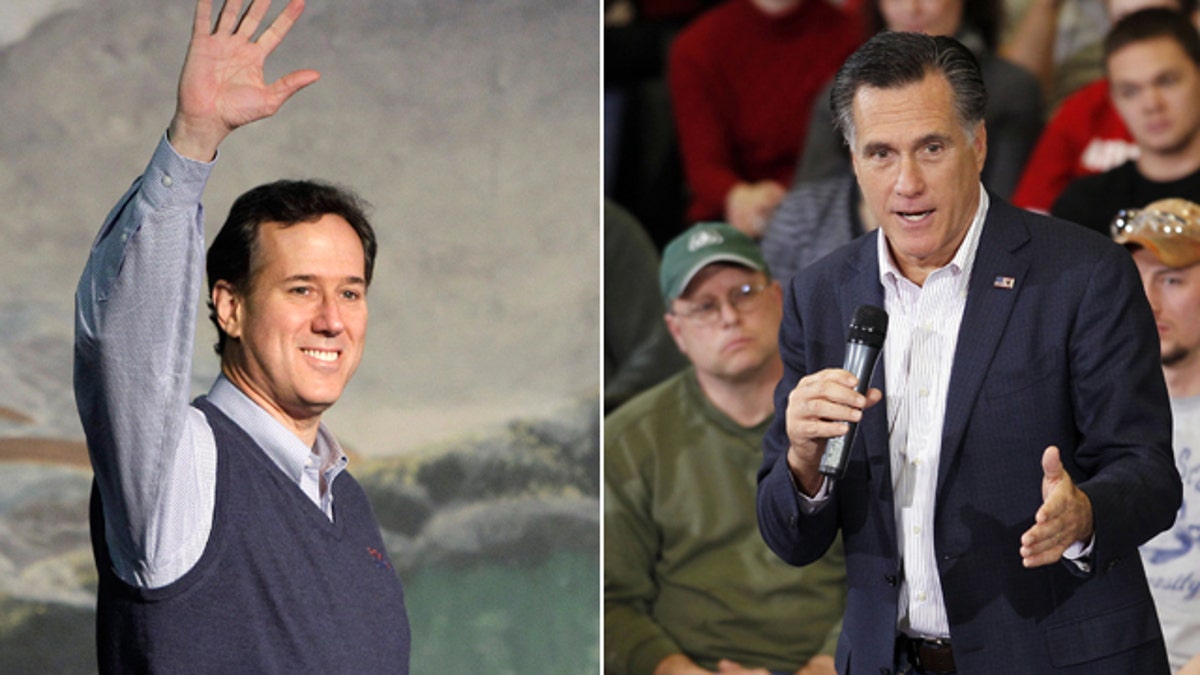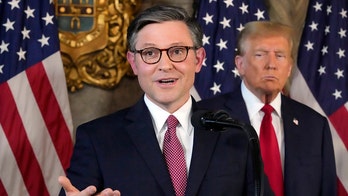
File: Republican presidential candidates Rick Santorum and Mitt Romney (AP/FNC)
The race for the Republican presidential nomination is about to take a big step forward, with 10 states weighing in Tuesday on the biggest day of voting yet in the two-month-old campaign.
With several key contests set for so-called "Super Tuesday" -- from the swing state of Ohio to the delegate-rich Georgia -- the four remaining candidates have pursued varying strategies for capitalizing on the day's voting and gaining momentum.
Mitt Romney remains the front-runner and could use a dominant showing Tuesday to all but eliminate doubt about his inevitability. But Rick Santorum continues to present a strong challenge, and polls have remained close in Ohio, a Midwestern industrial state where voters have an uncanny history of picking winners in presidential politics.
Newt Gingrich, the former speaker of the House of Representatives, is banking the future of his candidacy on winning in his home state of Georgia, where he holds the lead in polls. And Ron Paul continues his strategy of looking for delegates in caucus states, which are more easily dominated by highly motivated supporters of the small-government, low-tax candidate.
Primaries in Ohio, Georgia, Massachusetts, Vermont, Virginia, Oklahoma and Tennessee, and caucuses in Idaho, North Dakota and Alaska make Tuesday the busiest day of the primary season.
For Complete Super Tuesday Coverage >>>
Romney, a former Massachusetts governor and venture capitalist, already has a big lead in the number of delegates accumulated in primaries and caucuses held so far, and he is trying to project confidence.
"I hope that I get the support of people here in Ohio tomorrow, and in other states across the country. I believe if I do, I'll get the nomination," he said.
Santorum, a former Pennsylvania senator, is going all out in Ohio in an effort to regain the momentum that slipped away in his loss to Romney in Michigan last week. He had held a sizable lead in Ohio but Romney has closed that gap.
President Obama, meanwhile, is seeing his poll numbers rise in tandem with signs that the struggling U.S. economy may be on a course toward sustained recovery. A new NBC-Wall Street Journal poll released Monday shows him defeating all of the Republican candidates in hypothetical head-to-head matchups.
He also has been helped considerably by the Republicans having been driven badly off their economic message by a detour into a rancorous and nasty debate over whether religious-affiliated institutions -- not churches -- should be required to offer health insurance coverage for contraceptives.
An uproar, mostly among Catholic leaders who reject contraception on moral grounds, forced Obama to change the birth control mandate. The new plan would require insurance companies that cover workers in religious-affiliated institutions like hospitals and universities -- and not the religious organizations themselves -- to pay for the contraception coverage.
Romney and Santorum, meanwhile, were fighting it out for every single vote in Ohio.
Speaking to supporters at a guardrail factory in the industrial city of Canton, Romney tried to snap the subject back to the economy and away from social conservative issues.
"I look at this campaign right now and I see a lot of folks all talking about lots of things, but what we need to talk about to defeat Barack Obama is getting good jobs and scaling back the size of government, and that's what I do," Romney said. "Other people in this race have debated about the economy, they've read about the economy, they've talked about it in subcommittee meetings. But I've actually been in it."
Santorum told Ohioans the election must be earned, not "bought," in another swipe at Romney's advantage in funding and superior campaign machine. "Look into what the candidates have overcome and what they offer to this country -- not just what money they have, but where's the soul, where's the conviction, where's the fight?" he told hundreds of students and supporters at Dayton Christian School.
Santorum said that no matter how much Romney spends, "conservatives will not trust him, will not rally around him this primary season. ... We will be the nominee."
Nearly one-third of the 1,144 delegates needed to clinch the nomination are at stake Tuesday, a larger prize than all the previous primaries and caucuses combined. The nominee will be named in late August at the Republican National Convention in Tampa, Florida.
Obama picked Tuesday to hold his first news conference of the year, a chance to steal a bit of thunder from the Republicans on their big day and defend a record of economic stewardship that is under daily assault in the Republican campaign.
On the eve of Super Tuesday, the message coming from Republican establishment figures was clear: It's time, if not past time, to crystallize the competition and unite the party behind the effort to defeat Obama in the fall.
House Majority Leader Eric Cantor and Sen. Tom Coburn, one of the most conservative members of the Senate, were among the latest Republican luminaries to swing behind Romney. Conservative John Ashcroft, attorney general in the George W. Bush administration and a former Missouri senator, threw his support behind Romney on Monday.
Romney has won four consecutive contests, including Saturday's Washington state caucuses. His broad, well-disciplined organization all but assures he'll collect more delegates than his opponents on Tuesday. Santorum and Gingrich did not collect enough signatures to qualify for the Virginia ballot, for example, and Santorum cannot win 18 of Ohio's 66 delegates for similar reasons.
So far, Romney leads with 203 delegates from previous contests, Santorum has 92, Gingrich has 33 and Paul, 25.
The Associated Press contributed to this report.




